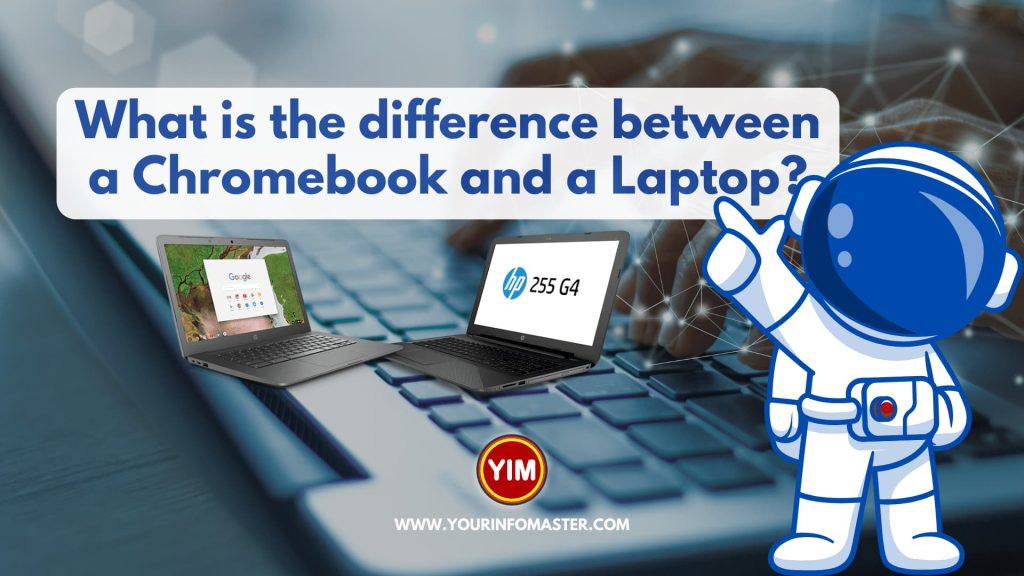I am going to explain the blog post “What is the difference between a Chromebook and a Laptop?“
In today’s digital age, it’s not uncommon for people to own multiple devices, such as laptops, tablets, and smartphones. However, when it comes to choosing between a Chromebook and a laptop, many people find themselves confused. While both devices may look similar, there are significant differences between them. In this blog post, we will explore the key differences between a Chromebook and a laptop.
A Chromebook is a type of laptop that runs on Google’s Chrome OS. Chrome OS is a lightweight operating system that is designed to be simple and easy to use. Unlike traditional laptops, which run on Windows or macOS, a Chromebook is entirely cloud-based. This means that all of your data is stored on Google’s servers, and you need an internet connection to access your files.
Read also: What is the difference between Eczema and Psoriasis?
10 Differences between a Chromebook and a Laptop
On the other hand, a laptop is a more traditional computing device that can run a variety of operating systems, including Windows, macOS, and Linux. Laptops typically have more storage space and processing power than Chromebooks, making them a better choice for more intensive tasks such as video editing, gaming, or programming.
Now, let’s dive into the 10 key differences between a Chromebook and a laptop.
Read also: What is the difference between Socialism and Communism?
Operating System
The most apparent difference between a Chromebook and a laptop is the operating system they run on. Chromebooks use Google’s Chrome OS, while laptops can run a variety of operating systems, including Windows, macOS, and Linux.
Price
Chromebooks are generally cheaper than laptops. This is because they have less storage space and processing power than traditional laptops, making them a more budget-friendly option.
Storage
Chromebooks typically have less storage space than laptops. This is because they rely heavily on cloud-based storage. However, many Chromebooks come with a small amount of local storage for offline use.
Processing Power
Laptops typically have more processing power than Chromebooks. This is because they have more powerful CPUs, GPUs, and RAM, making them a better choice for more intensive tasks such as video editing or gaming.
Software
Chromebooks are limited in terms of the software they can run. This is because they rely heavily on web-based applications rather than traditional desktop software. However, many popular web-based applications, such as Google Docs and Microsoft Office, are available on Chromebooks.
Battery Life
Chromebooks typically have better battery life than laptops. This is because they use less power than traditional laptops, which makes them ideal for people who need to use their device for extended periods without access to a power source.
Portability
Chromebooks are generally more portable than laptops. This is because they are smaller and lighter than traditional laptops, making them ideal for people who need to use their device on the go.
Connectivity
Chromebooks are designed to be always connected to the internet. This means that they have built-in Wi-Fi and Bluetooth capabilities, but they may not have as many ports as traditional laptops.
Security
Chromebooks are generally more secure than laptops. This is because they rely heavily on cloud-based storage, which means that your data is stored on Google’s servers rather than on your device.
Customizability
Laptops are generally more customizable than Chromebooks. This is because they can run a variety of operating systems and software, giving users more control over their device’s functionality and appearance.
Read also: Can labs tell the difference between real and synthetic urine?
Conclusion
In conclusion, while Chromebooks and laptops may look similar, there are significant differences between them. Chromebooks are generally cheaper, more portable, and more secure than laptops, making them a great choice for people who need a simple and easy-to-use device for basic computing tasks. However, if you need more processing power, storage space, or customizability, a traditional laptop may be a better choice. Ultimately, the choice between a Chromebook and a laptop depends on your specific needs and budget. If you’re someone who primarily uses your device for browsing the web, checking emails, and working on simple documents, a Chromebook may be a great choice for you. On the other hand, if you’re a power user who needs more storage space and processing power, a laptop may be a better choice.
It’s important to consider your individual needs and preferences when choosing between a Chromebook and a laptop. Think about what you’ll primarily use your device for, how often you’ll need to use it on the go, and how much you’re willing to spend. By doing your research and carefully considering your options, you can choose the device that best fits your needs and budget.
In summary, the difference between a Chromebook and a laptop boils down to their operating systems, price, storage, processing power, software, battery life, portability, connectivity, security, and customizability. Each device has its own set of advantages and disadvantages, so it’s important to carefully consider your needs before making a decision. Whether you choose a Chromebook or a laptop, remember that the most important thing is to have a device that works for you and helps you achieve your goals.
Read also: What is the difference between bisexual and pansexual?
If you really enjoyed the article “What is the difference between a Chromebook and a Laptop?,” then I would be very grateful if you’d help it spread by emailing it to your friends or sharing it on Twitter, Instagram, or Facebook. Thank you!
Have you read “What is the difference between a Chromebook and a Laptop?“ Which of these blogs are you reading, and how is it similar to one of them?

